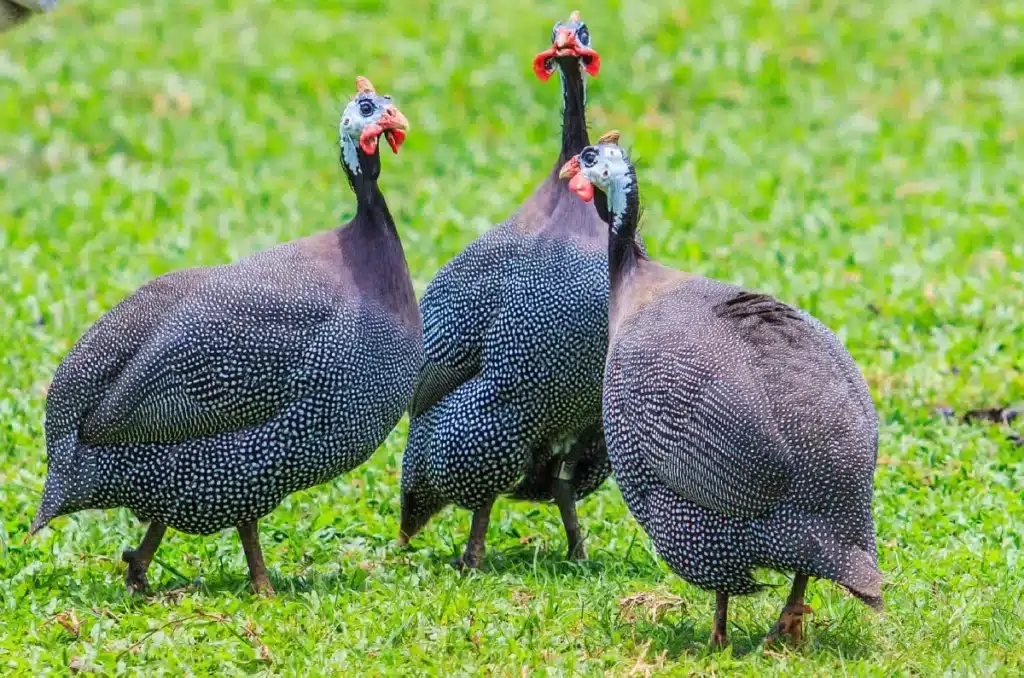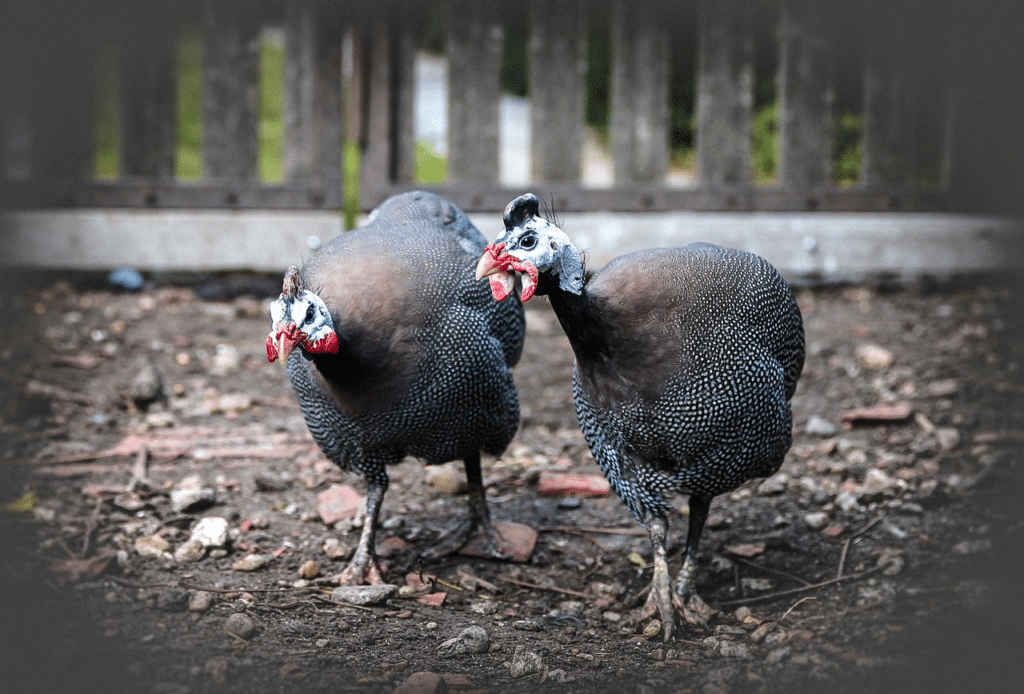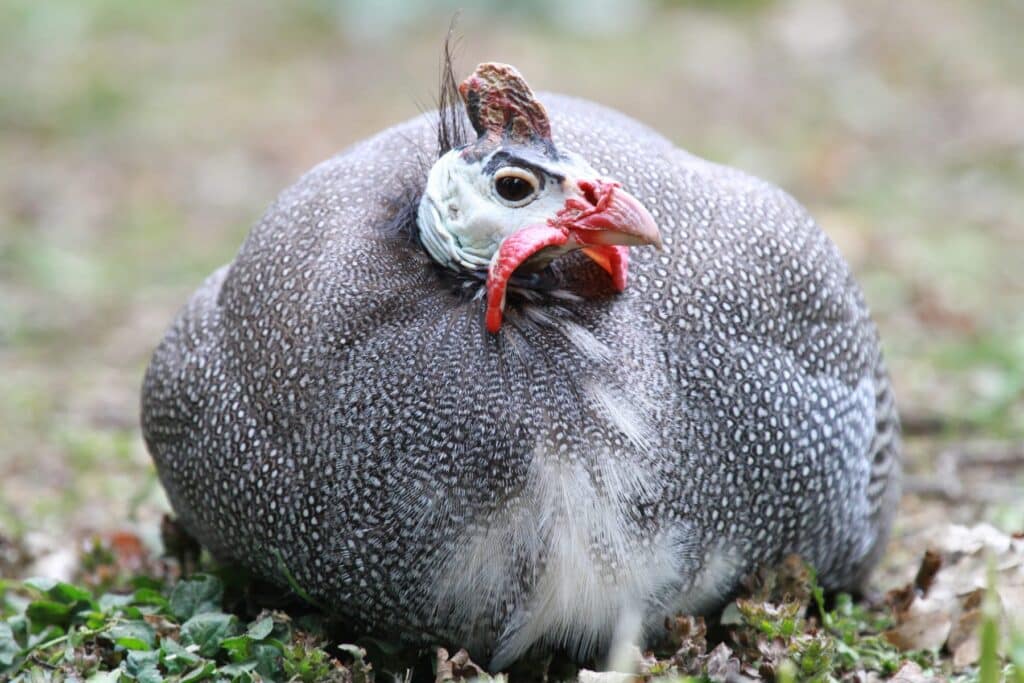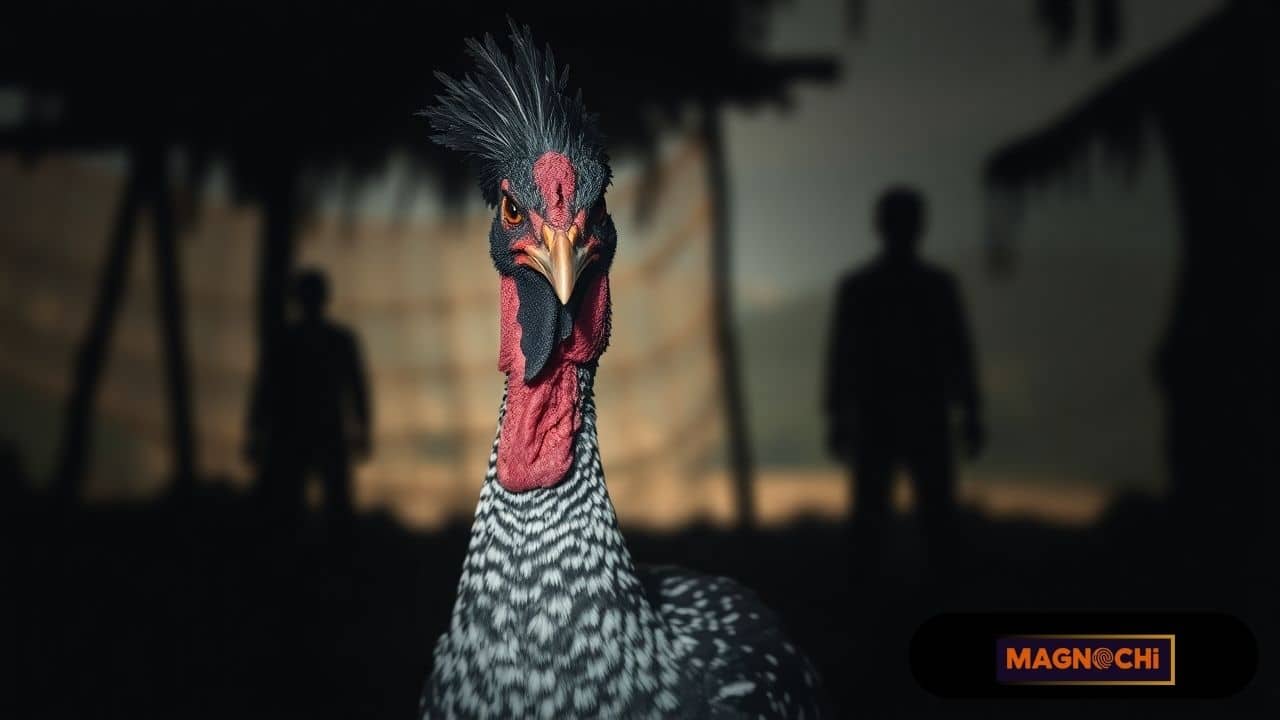Do Guinea Fowl Attack Humans? Guinea fowl are often regarded as gentle, quirky birds known for their pest-control abilities, peculiar looks, and fascinating behavior.
Raised for their meat, eggs, and natural knack for keeping insect populations under control, guinea fowl are a valuable asset to farmers, homesteaders, and even suburban backyard gardeners.
However, beneath their seemingly docile exterior, guinea fowl can sometimes display aggressive behavior especially toward humans.
If you’ve been wondering whether guinea fowl attack humans or if you’re curious about why these birds sometimes act defensively, you’re not alone. Guinea fowl are often seen as silent watchers, but their aggression can catch you off guard.
In this comprehensive guide, we will explore the causes of guinea fowl aggression, what triggers them, and how to safely manage any potentially hostile encounters with these fascinating birds.
What Are Guinea Fowl?
Physical Characteristics and Appearance
Guinea fowl, scientifically known as Numididae, are medium-sized birds with a striking and unique appearance. Known for their distinctive helmet-like structure on their heads, these birds have a sleek body covered in speckled gray or blue feathers.
They range from 1 to 3 pounds in weight and typically measure 18 to 22 inches in length. Their most notable physical characteristic is their helmet, which protrudes from the top of their head, making them instantly recognizable.
Unlike chickens, guinea fowl have small, beady eyes, and their overall body shape is slender, giving them an elegant yet somewhat alert demeanor.
Guinea fowl also possess long, thin legs and sharp claws, which they use to scratch and forage for food. Their sharp beaks and strong legs also make them formidable if they feel threatened or are protecting their young.
Habitat and Distribution
Native to sub-Saharan Africa, guinea fowl have adapted well to different environments, from savannas to forest edges.
In their natural habitat, they tend to live in small flocks and often seek out open woodlands or grasslands for shelter and food. [Do Guinea Fowl Attack Humans?]
These birds are primarily ground-dwellers and are excellent foragers, feeding on a wide range of seeds, fruits, insects, and small animals like snails or frogs.
In modern-day agriculture and suburban settings, guinea fowl are often raised as a natural alternative to chemical pesticides due to their strong avian pest-control abilities.
They are particularly useful in controlling ticks, insects, and even snakes, which makes them highly valued by farmers and gardeners alike.
Diet and Pest Control Role
One of the primary reasons guinea fowl are so widely loved in agricultural circles is their pest-control capabilities.
Guinea fowl will naturally forage for insects such as ticks, beetles, and ants, helping reduce the need for artificial pest management.
Their instinctual foraging behavior makes them a valuable ally in managing unwanted pests in gardens, fields, and even lawns.
In fact, guinea fowl can significantly reduce the number of ticks on a property, which can be especially important in areas with high risks of Lyme disease.
Farmers also appreciate guinea fowl for their ability to control rodents, as they will chase down and even kill small mammals.
They act as a natural form of pest management, which is one of the main reasons for their popularity in agriculture.

Understanding Guinea Fowl Behavior
Social Structure and Communication
Guinea fowl are highly social animals that live in flocks. The flock is typically organized with a clear hierarchy, where dominant individuals take charge of foraging, protecting the group, and deciding where the flock should move.
Guinea fowl communicate with each other through various vocalizations and body language. Their calls, which include loud alarm calls and softer murmurs, are used to signal danger or alert other members of the flock to potential threats.
Within the flock, the social structure is essential for maintaining order. Guinea fowl generally follow a clear flock hierarchy, where the dominant bird makes the majority of decisions for the group.
Lower-ranking birds typically yield to the more dominant ones, but when their position is threatened, they can become more assertive.
Guinea fowl are also highly alert creatures. Their vigilant nature helps them detect predators or changes in the environment quickly.
While this makes them excellent at detecting potential dangers, it also means they can become easily startled or anxious in unfamiliar situations.
This heightened sense of awareness can sometimes lead to aggression if they perceive something as a threat. [Do Guinea Fowl Attack Humans?]
Hormonal Changes and Aggression
The behavior of guinea fowl is also influenced by hormonal changes, particularly during the breeding season. During this period, both males and females experience heightened aggression as they become more protective of their territory and their nests.
The hormonal changes associated with the mating process are the primary reason guinea fowl become more territorial and defensive.
Males, in particular, may show aggressive tendencies when competing for mates or when defending their nesting areas.
Hormonal aggression can also be exacerbated by stress, environmental changes, or the presence of other animals that threaten the guinea fowl’s established territory.
It’s common for guinea fowl to display an increase in defensive behavior during this time, making them more likely to engage in aggressive actions toward perceived threats.

Do Guinea Fowl Attack Humans?
General Behavior Toward Humans
Although guinea fowl are generally peaceful toward humans, they can become aggressive under certain circumstances. In general, guinea fowl are not naturally inclined to attack humans unless they feel threatened or provoked.
Most encounters between humans and guinea fowl are non-hostile, especially if the bird is raised in a familiar environment and interacts regularly with people. [Do Guinea Fowl Attack Humans?]
However, guinea fowl have a tendency to act defensively if they feel that their territory, food, or offspring are in danger. They may respond aggressively to human presence near their nesting area or during the mating season, which is when their territorial instincts are at their peak.
Even if they do not attack outright, they may exhibit defensive behaviors such as pecking, chasing, or flapping wings to drive off the perceived threat.
Aggressive Behaviors and Warning Signs
If a guinea fowl is about to attack or defend itself, it will often exhibit certain warning signs before taking further action. Common signs of aggression in guinea fowl include:
- Loud vocalizations: Guinea fowl are known for their high-pitched alarm calls when they sense danger. These calls may be an attempt to alert the flock or warn intruders.
- Flapping wings: When startled or feeling threatened, guinea fowl will flap their wings rapidly as a display of aggression or to create space between themselves and the perceived threat.
- Pecking: Guinea fowl have sharp beaks that they use to forage for food, but they can also use them for self-defense. A peck can be painful and may serve as a warning to humans who are too close to their nests or young.
- Chasing: Guinea fowl are fast and agile birds, capable of chasing intruders away from their territory if necessary.
If you encounter an aggressive guinea fowl, it’s important to recognize these signals and act accordingly.
Reasons for Aggression in Guinea Fowl
Protecting Their Territory and Young
The primary reason guinea fowl become aggressive is to protect their territory and young. Guinea fowl are fiercely protective of their nests, and this protection extends to their chicks.
They will go to great lengths to ensure that no threats approach their nesting areas or disturb their offspring. In the wild, this aggressive behavior is essential for the survival of their species.
If you approach a nesting area or accidentally disrupt a guinea fowl’s territory, be prepared for a defensive response. These birds are equipped to handle threats through physical aggression, including pecking, flapping, and chasing.
Hormonal Aggression During Mating Season
As with many animal species, hormonal changes during the mating season significantly impact guinea fowl behavior. During this time, males, in particular, can become especially territorial.
The drive to reproduce amplifies their need to defend their territory against any perceived intruders, including humans.
Increased aggression during breeding season is common in many bird species, and guinea fowl are no exception.
During this period, guinea fowl may be more likely to attack or display aggressive behaviors, especially if their nesting area is disturbed or if they feel their mate is at risk.
Misinterpretation of Human Behavior
Sometimes, guinea fowl’s aggressive behavior is the result of a misinterpretation of human behavior. [Do Guinea Fowl Attack Humans?]
For instance, they may perceive an outstretched hand or sudden movement as a threat. If you approach them too quickly or too forcefully, the guinea fowl may react defensively.
In addition, guinea fowl may not always distinguish between a genuine threat and a non-threatening action.
Their heightened awareness makes them quick to react, and this is often why they seem to attack humans who simply appear to be walking too close to their nesting area or flock.

How to Handle Aggressive Guinea Fowl
Tips for Managing Aggression
Handling aggressive guinea fowl requires patience and understanding of their behavior. Here are some tips for managing and avoiding aggression:
- Stay calm: Guinea fowl are less likely to become aggressive if you remain calm and avoid sudden movements.
- Avoid their nesting area: Respect the bird’s territory, especially during the breeding season when they are most protective.
- Use barriers: If you need to handle guinea fowl or interact with them, consider using barriers such as a fence or enclosure to prevent close contact.
- Regular socialization: If you are raising guinea fowl from chicks, spend time socializing with them early on to help them become accustomed to human presence.
What to Do If a Guinea Fowl Attacks
If a guinea fowl does become aggressive, it’s important to protect yourself while avoiding escalation:
- Step back slowly: Avoid sudden movements or running, which can provoke the bird further.
- Use an object to shield yourself: If the guinea fowl becomes particularly aggressive, use an object (like a broom or a long stick) to keep a safe distance.
- Protect sensitive areas: Guinea fowl may target your face or hands, so be mindful of where the bird is attacking.
Preventing Aggressive Encounters
How to Minimize Aggression
Preventing aggressive encounters with guinea fowl can be done by following a few key strategies:
- Provide ample space: Guinea fowl need space to roam and forage. Overcrowding or restricting their movement can make them feel stressed and lead to more aggressive behaviors.
- Respect their space: Always give guinea fowl enough room, particularly around their nests and when they are with their chicks.
- Feed them properly: Ensure your guinea fowl are well-fed and healthy. Hunger can lead to increased aggression, so providing a proper diet helps maintain calm behavior.
Training Guinea Fowl for Better Interaction
Training guinea fowl to tolerate human presence is a gradual process. Start by interacting with them regularly when they are young, and offer them food and treats.
Over time, they will become more comfortable with human interaction, and their tendency to react aggressively will decrease. [Do Guinea Fowl Attack Humans?]
FAQs
Will guinea fowl attack people?
Guinea fowl usually aren’t aggressive toward people. However, they can attack if they feel their territory or young are threatened. They might peck or chase humans if they perceive danger. It’s important to respect their space, especially during breeding season.
Are guinea fowl friendly to humans?
Guinea fowl can be friendly, especially if raised around humans from a young age. They are naturally cautious but can warm up to human interaction over time. However, they may still be wary of strangers. Regular, gentle handling helps improve their tolerance.
Why is my guinea fowl aggressive?
Guinea fowl may become aggressive when protecting their territory, young, or during the breeding season. Hormonal changes and a perceived threat can trigger aggression. Overcrowding or stress can also lead to hostile behavior. Ensuring a calm environment helps reduce aggression.
Will guinea fowl attack cats?
Yes, guinea fowl can be aggressive toward cats, especially if they feel their young are in danger. They might chase or peck at cats that approach their territory. However, they are more likely to defend themselves than actively hunt cats. Be cautious around their nests.
Are guinea fowl bad parents?
Guinea fowl are generally good parents and protective of their chicks. They will guard their young and keep them safe from predators. However, sometimes they can be overly protective, making it difficult for humans to interact with the chicks. Their instinct to protect is strong.
What is the problem with guinea fowl?
The main issue with guinea fowl is their aggressive behavior when threatened, especially during the breeding season. They can be noisy and difficult to manage in smaller spaces. They also need lots of space and proper care to thrive. Without these, they can become stressed and difficult.
Is guinea fowl poisonous?
No, guinea fowl are not poisonous. They do not produce any toxins that could harm humans or other animals. However, it’s important to handle them carefully to avoid any pecking or scratching. They are completely safe to have around.
Do guineas carry diseases?
Guinea fowl can carry diseases, like any wild or domesticated birds. They can transmit salmonella or campylobacter, which are common bacterial infections. Practicing good hygiene and washing hands after handling them can reduce the risk of disease transmission.
Conclusion: Do Guinea Fowl Attack Humans?
Guinea fowl, while typically docile and useful for pest control, can become aggressive under certain circumstances. Territorial behavior, hormonal changes during the mating season, and protective instincts toward their young can cause these birds to display aggression.
By understanding their behavior and respecting their boundaries, you can maintain a peaceful and safe relationship with guinea fowl, whether you’re keeping them for their natural pest control abilities or simply enjoying their unique presence on your farm or in your backyard. [Do Guinea Fowl Attack Humans?]
Read more knowledgeable blogs on Magnochi









